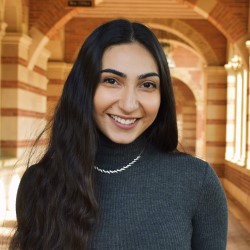An Ode to Our Partners

Ikaasa Suri
— MEDICAL SCHOOL —
Icahn School of Medicine at Mount Sinai
— GRADUATING CLASS —
2026
When I first got engaged at the end of my scholarly year, my first thought was How am I going to plan a wedding during my third year of medical school? Almost immediately, I began to worry about how I was going to balance planning a multi-day event for hundreds of people with shelf exam prep, whether all those hours practicing sangeet dance performances and studying the meaning behind the Sikh marriage ceremony would mean sacrificing time spent on research and/or my health-tech startup, and if hours spent on calls with vendors would mean less time for cultivating stronger relationships with my mentors.
While I may be one of just a handful of students who decided to get married during her clerkship year, I know that I am not the only medical student for whom life has seemingly gotten in the way. And I am confident that we have all contemplated whether these life events––for better or for worse––will in some way detract from our medical training.
The third year of medical school is an immersion into the raw, unfiltered realities of medicine. It is a year of emotional extremes—profound sadness when a beloved patient doesn't make it, exhilaration when we call a rapid that ends up saving a patient's life, satisfaction when we know the answer to an esoteric question during rounds, joy when we help bring a newborn into this world, turmoil as we adjust to a new team every few weeks, connection when we're able to communicate with a patient in their native language, and deep humility when we sit down with a patient and their family to discuss their end-of-life goals. It is a year of exhaustion, of doubt, of sleepless nights, of questioning whether we are enough. And yet, it is also a year of immense growth, of learning to trust ourselves, of glimpsing the physicians we are becoming.
For me, this year has been all of these things and more. I have felt overwhelmed, stretched beyond my limits, and, at times, disconnected from my own sense of self. But through it all, I have had a constant—my fiancé and our joint efforts in organizing the first step in our next chapter of life together.
I used to think that planning a wedding in the middle of clerkships would be nothing short of a burden—one more thing on my already overflowing plate. But instead, it has been a profound source of perspective—reminding me both of who I am outside of my white coat and the personal values I want to bring into my practice of culturally competent, empathetic, and holistic patient care. As I have navigated the transition into a number of new roles over the course of this past year—student doctor, fiancée, daughter-in-law, bride—I have gained a deeper appreciation for the many ways our patients must also adapt, as they move from healthy to sick, janitor or salesperson to patient, prepartum to new parent, unaware to stage IV, or within the comfort of their own homes to the medicine floor.
In the midst of grueling rotations, wedding planning has grounded me in the relationships that matter most, in the love and community that sustain me. It has given me clarity on what I want from my career—not just in terms of specialty but in the kind of doctor I want to be. I want to be a physician who remembers that patients are more than their diagnoses—they have families, beliefs, and past experiences that all must be taken into account in providing care.
But this isn't just an ode to my fiancé. It is an ode to all the partners who walk alongside us in this journey—our significant others, yes, but also our parents, our friends, our mentors, our communities. The people who remind us to eat, who force us to step outside and breathe, who listen to our frustrations and fears, who keep us tethered to our humanity when the weight of medical training threatens to pull us away from it.
Medical school can be isolating. The long hours, the constant pressure, the emotional toll—these things can make it easy to believe that we must shoulder this burden alone. But we are never truly alone. Our partners stand beside us, even when we don't always recognize the role they play. Sometimes, we see them as yet another obligation—another text to respond to, another event to attend, another expectation to meet. But more often than not, they are our lifeline. They are the ones who see us beyond our titles, beyond our fatigue, beyond our stress, and remind us of the bigger picture.
These relationships shape us as future physicians. They teach us empathy, patience, and gratitude. They remind us that medicine is not just about knowledge and technical skill, it's about connection—both with our patients and with the people who make us whole. They show us what it means to care deeply, not just for others but for ourselves.
As I move forward, I carry these lessons with me. I will continue to feel deeply, to struggle, to celebrate, to grow. But I will also continue to lean on the people who have been my rock through it all. Because at the end of the day, being a good doctor is not just about surviving medical school. It is about embracing the fullness of life—the love, the challenges, the connections that shape us into the people, and the physicians we are meant to be.
Back to the July 2025 issue of ACP IMpact

